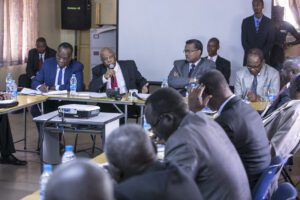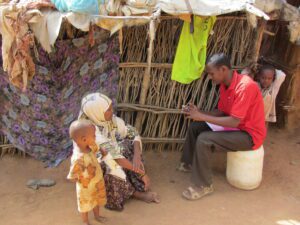In the heart of East Africa, where dreams of progress dance with the rhythms of tradition, mid-term evaluation services in Uganda stand as silent guardians of change. These pivotal moments, halfway through a project’s journey, weave a tapestry of challenges and triumphs that shape the course of development.
Understanding Mid-Term Evaluations
Mid-term evaluation services in Uganda are not mere checkpoints but threads of insight woven into the fabric of project life. They unravel the mysteries of progress, revealing paths trodden and those yet to be forged. These evaluations breathe life into data, turning numbers into narratives and setbacks into stories of resilience.
Common Challenges in Mid-Term Evaluations
Lack of Baseline Data
At the heart of every mid-term evaluation lies the quest for truth. Yet, without the foundation of baseline data, this truth remains elusive. Mid-term evaluation services in Uganda often struggle to gather this initial thread of knowledge, leaving evaluations adrift in a sea of conjecture.
Limited Stakeholder Engagement
Stakeholders, the custodians of change, hold the key to meaningful evaluation. However, their voices often echo faintly through the corridors of decision-making. Mid-term evaluation services in Uganda must bridge this gap, weaving stakeholders’ narratives into the fabric of their evaluations.
Insufficient Resources
In the crucible of progress, resources are the alchemy that transforms vision into reality. Yet, mid-term evaluation services in Uganda frequently find themselves shackled by scarcity. Like a painter without a brush, evaluators struggle to capture the nuanced strokes of development.
Cultural and Language Barriers
Uganda’s cultural mosaic paints a vibrant backdrop for development, yet it also poses intricate challenges. Mid-term evaluation services in Uganda must navigate this kaleidoscope of languages and customs, translating data into stories that resonate across diverse communities.
Data Collection Issues
In the labyrinthine journey of evaluation, reliable data is the compass that guides. Yet, mid-term evaluation services in Uganda often grapple with broken compasses – from low response rates to logistical tangles in remote terrains. These challenges obscure the path to clarity.
Bias in Evaluation
Like shadows cast by the setting sun, bias lurks in the corners of evaluation. Mid-term evaluation services in Uganda must wield the lantern of objectivity, illuminating truths obscured by personal agendas and institutional pressures.
Time Constraints
Time, the silent orchestrator of change, often conducts its symphony at a relentless pace. Mid-term evaluation services in Uganda feel its weight, racing against the tide to unravel complexities and distill insights within fleeting moments.
Inadequate Training for Evaluators
In the labyrinth of evaluation, knowledge is the compass that steers the course. Yet, mid-term evaluation services in Uganda often find themselves navigating uncharted waters, lacking the skilled navigators needed to chart the seas of development.
Political Influence
In the theater of development, politics casts a long shadow over truth. Mid-term evaluation services in Uganda must dance delicately amidst these political currents, safeguarding the sanctity of their evaluations from the tempests of vested interests.
Environmental Factors
Uganda’s embrace of nature is both a canvas and a crucible for development. Yet, mid-term evaluation services in Uganda must weather the storms and droughts that nature paints upon this canvas, adapting their methodologies to the rhythm of the land.
Overcoming Challenges in Mid-Term Evaluations
Establishing Baseline Data
Begin with the ink of truth – baseline data. Mid-term evaluation services in Uganda must dip their quills into the wellspring of foundational knowledge, sketching the starting point that anchors evaluations amidst the currents of change.
Enhancing Stakeholder Engagement
Stakeholders, the weavers of change, must be invited to dance with evaluation services. Mid-term evaluation services in Uganda should craft spaces of dialogue and inclusion, where stakeholders’ voices echo through the corridors of decision-making.
Allocating Sufficient Resources
Resources, the bedrock of transformation, must be sought and stewarded wisely. Mid-term evaluation services in Uganda must advocate for the palette of funds, skills, and technology needed to paint a vivid picture of progress.
Addressing Cultural and Language Barriers
Uganda’s cultural tapestry is both a labyrinth and a treasure trove for evaluation services. Mid-term evaluation services must employ local guides, fluent in the dialects of tradition, to navigate these cultural currents and render data in shades that resonate.
Improving Data Collection Methods
In the symphony of data, precision is the conductor’s baton. Mid-term evaluation services in Uganda must refine their instruments – from mobile surveys that traverse hills to cloud technologies that cradle data in the embrace of security.
Mitigating Bias in Evaluations
Objectivity, the lodestar of truth, must guide the compass of evaluation. Mid-term evaluation services in Uganda must cultivate a culture of transparency, where multiple lenses scrutinize data and biases are laid bare beneath the light of scrutiny.
Effective Time Management
Time, the sculptor of opportunity, must be carved into the rhythm of evaluation. Mid-term evaluation services in Uganda must choreograph timelines with precision, balancing thoroughness with the cadence of change.
Providing Adequate Training
Knowledge, the compass that steers evaluation, must be forged through continuous learning. Mid-term evaluation services in Uganda must sharpen the skills of their navigators, equipping them with the tools to navigate the currents of development.
Reducing Political Influence
Politics, the tide that ebbs and flows, must be held at bay from the shores of evaluation. Mid-term evaluation services in Uganda must erect bastions of independence, where the findings of evaluation stand as lighthouses, guiding policy amidst the storms of influence.
Adapting to Environmental Factors
Nature, the canvas of life, must be painted with the brush of resilience. Mid-term evaluation services in Uganda must flex with the seasons, adapting their methodologies to the contours of Uganda’s landscape and the rhythms of its climate.
Case Studies: Success Stories from Ugandan Projects
Case Study 1: Effective Stakeholder Engagement
In the heartlands of Uganda, a health project blossomed through engagement. Mid-term evaluation services bridged gaps with stakeholders, fostering trust and weaving their insights into the fabric of evaluation.
Case Study 2: Innovative Data Collection Methods
Across Uganda’s wilds, a conservation project thrived through innovation. Mid-term evaluation services embraced technology, using mobile surveys to map wildlife and cloud technologies to safeguard data amidst the savannas.
Case Study 3: Overcoming Cultural Barriers
In northern Uganda, a literacy initiative flourished through cultural understanding. Mid-term evaluation services spoke the language of tradition, hiring local evaluators and honoring customs to unveil truths hidden within the folds of culture.
Conclusion
Mid-term evaluation services in Uganda are not merely waypoints but beacons of change amidst the currents of development. Though challenges abound, from data droughts to political storms, they are met with resilience and innovation. By anchoring evaluations in truth, engaging stakeholders with empathy, and navigating Uganda’s diverse landscapes with grace, mid-term evaluation services pave the path to progress.
Frequently Asked Questions (FAQs)
What is the primary goal of mid-term evaluation services in Uganda?
The primary goal of mid-term evaluation services in Uganda is to assess project progress, identify challenges, and make informed adjustments to steer projects towards success.
How can mid-term evaluation services in Uganda address cultural barriers?
Mid-term evaluation services in Uganda can address cultural barriers by hiring local evaluators, using culturally sensitive data collection methods, and fostering inclusive dialogue with communities.
Why is baseline data crucial for mid-term evaluation services in Uganda?
Baseline data provides a starting point for mid-term evaluations, enabling comparisons and insights into project progress over time.
What role does stakeholder engagement play in mid-term evaluation services in Uganda?
Stakeholder engagement is essential for mid-term evaluation services in Uganda as it ensures diverse perspectives are considered, enhances project relevance, and fosters community ownership.
How can mid-term evaluation services in Uganda mitigate bias in evaluations?
Mid-term evaluation services in Uganda can mitigate bias by promoting transparency, involving multiple evaluators, and adhering to ethical standards in data collection and analysis.






